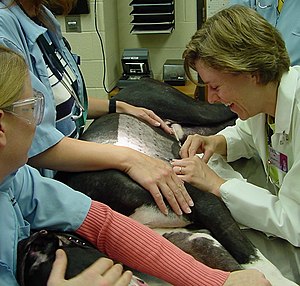But for now, a few quick answers.

- Image via Wikipedia
I know of one veterinarian who has used veterinary cephalexin, an antibiotic, to treat his family for years. I’ve seen no ill effects. I don’t know if he orders his medicine from a human or animal supplier, but will have to ask. I don’t think veterinary medicines are necessarily cheaper, but they may be more readily available. Still, veterinary suppliers state that a prescription is required for veterinary antibiotics, and I don’t suggest circumventing the law. If there is no other medicine available and the condition is life-threatening, I would be willing to take veterinary antibiotics myself, at least the canine variety. This topic will be covered in more detail at a later date.

- Image via Wikipedia
What should people do who are on expensive immunosuppressants or disease-modifying drugs?
These medicines fall into two categories: those that are life-sustaining and those that relieve symptoms. When used for symptom relief, most of these medications are, in a sense, a replacement for corticosteroids, such as prednisone. One big reason doctors use them is to avoid the side-effects of chronic steroid use including elevated blood sugar, weight gain, and bone density loss. My patients who have taken Humira or Embrel, for example, actually seem to feel better on steroids, so reverting to prednisone or even a non-steroidal anti-inflammatory drug is a consideration. Having been a doctor long enough to remember patient care before these drugs existed, I can say that many patients did reasonably well on steroids. Consulting with your physician about this possibility, regarding a ‘just in case’ scenario, is a good idea.
The other issue is the cost of the drugs, often $1,000 or more per month. Insurance won’t cover a stockpile and most people would have trouble affording them. Again, more on this later. I’d recommend at least having a stockpile of prednisone available.
For those on anti-rejection drugs, I will need to do more research. Again, prednisone has been used for this purpose, depending on the organ transplanted, and may or may not be effective. If anyone reading is on a particular drug, please let me know what it is, and I’ll look into it. This is a vital question, as these drugs are life-sustaining.

- Image via Wikipedia
This is another complex question. How is shelf-life determined and what does it actually mean?
A very simplistic answer is to say that if a pill or capsule appears to be intact and is not a controlled-release medication, it is probably safe to use at least a few years beyond the expiration date. I’ve certainly used expired samples myself but cannot officially recommend this. Yet logic dictates that a medicine cannot be 100% safe one day and 100% unsafe the next.
Depending on the drug, expiration date may include factors such as: efficacy of the drug; deterioration of the drug into component or derivative chemicals, isomers, or ‘metabolites’ (which may or may not be effective or safe); tendency to dissolve, crumble, mold, dessicate, or hydrate; degradation of the controlled-release mechanism (which then may deliver the full dose all at once rather than over 12 to 24 hours, or perhaps not at all); stability of other ingredients which make up the pill; and a host of other factors.
As a rule, keeping a medication in a reasonably cool (40-60 degrees F), low-humidity environment should at least help keep the form of the pill intact and less susceptible to the multiple forms of degradation. Most antibiotics are in this category, though a few are extended-release, which is a concern. One drug in suspension form, Augmentin, must be refrigerated to maintain the viability of the clavulanic acid component once water has been added.
As you can see, this complicated area will need further attention.

- Image via Wikipedia
Most hypothyroid patients currently take Synthroid, or a generic of this synthetic levothyroxine hormone. Before it was available, everyone took Armour thyroid or an equivalent, basically dessicated thyroid from animal sources. People have been known to become hyperthyroid from eating ground beef when the butcher unknowingly included beef-thyroid tissue in the mix. If no manufacturing capability exists, finding an animal source is an option, but dosing is another factor to be discussed.
Obtaining a year or two supply of thyroid medication is a good idea, even though at TEOTWAWKI no blood monitoring would be performed. At this time I would suggest approaching your doctor about a supply of Synthroid or Armour thyroid, per my guest blog on Survivalblog.com. I’ll be talking with a butcher and reviewing the manufacturing process in the future to explain more options.
Keep tuned, and keep your questions coming via the comments and questions page.
At the moment, it’s a beautiful day, and the end of the world will have to wait. God bless.




Basically, aromatherapy involves employing essential oils that have been extracted from a variety of plants which are believed to have properties that produce a beneficial therapeutic impact. Nevertheless, contrary to well-known conception, aromatherapy is not a modern idea; rather, it’s just that the term has only recently been formed in the twentieth century, though the history of aromatherapy actually, goes way back in time.
I have heard that feline & equine antibiotics are safer for humans than canine drugs because they are formulated to be purer, since cats & horses can’t handle the impurities that dogs can. I’m not a vet, though — it’s just what I was told by one.
***
[My veterinarian friend, who uses various veterinary drugs on his own family after consulting with me, says “veterinary drugs are the same as human drugs,” meaning he’s (obviously) not afraid to use them on his loved ones. He did not discriminate between animals, though. Any vets out there who’d like to comment? – Doc Cindy]
I want to know what I can stock up on for treating a person who has no thyroid. Since I am on Medicaid, my doctor will not or cannot give me extra medicine. I want some control over my life when it all happens. I will take my health into my hands and God’s, if some one gives me info on what to do. Doing something is better than doing nothing. What can I take if I have no synthroid that will extend my life? It is up to me to purchase or buy supplies to keep me going. Just let me know what and how and maybe where.
See answers to Christine L’s questions. One comment, though. Being on Medicaid has little to do with whether your doctor can prescribe you extra medication, as long as you’re willing to pay for it yourself. Brand-name Synthroid is not that expensive, and generic levothyroxine is dirt-cheap ($10 for 90 tablets at discount pharmacies). You may also want to read my article on “How to Get Your Doctor to Help You Stockpile Medicine” at http://armageddonmedicine.net/?p=76
Thank you for all you do. I had done some reading about SLEP and your reference to it caught my attention. It appears database access is VERY tightly controlled and I’m curious if information in this program has become available elsewhere. Thx again & God bless … Tom
The scientific journal with the SLEP data summary is: The Journal of Pharmaceutical Sciences, Vol. 95, No. 7, July 2006. Your local library could obtain a copy, though you may have to pay for it. My next SurvivalBlog post will include additional info from this article.